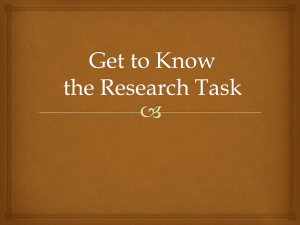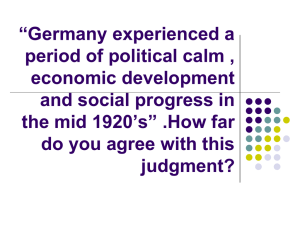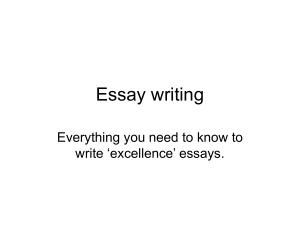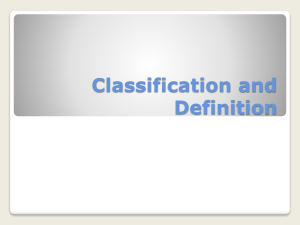for and against essay tips
advertisement
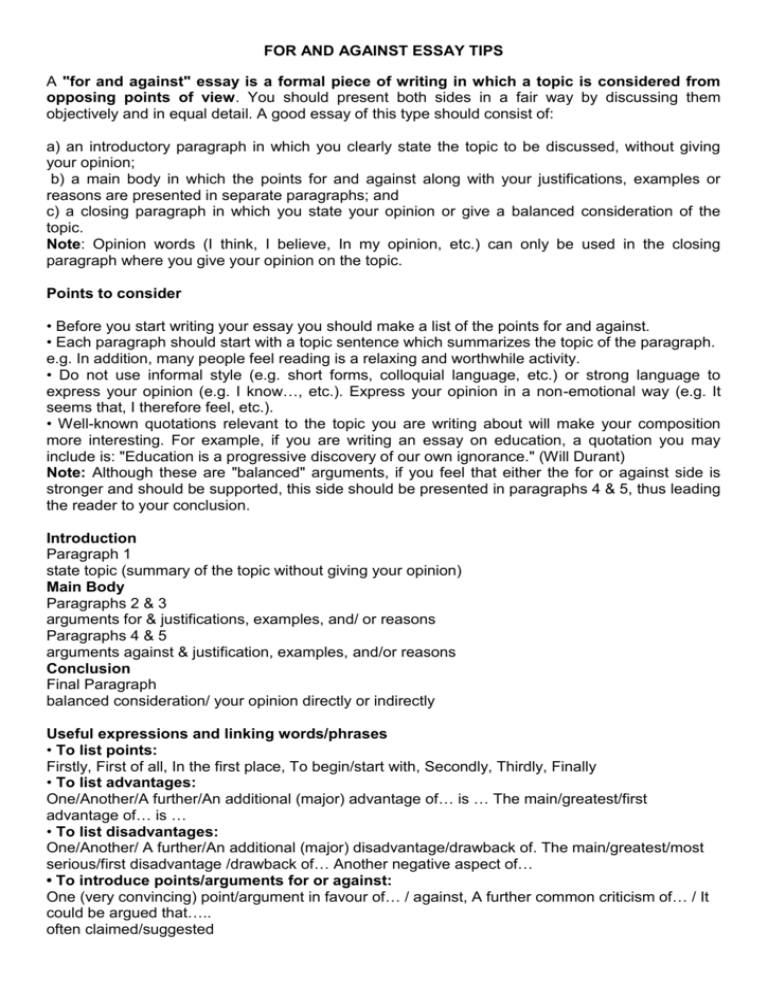
FOR AND AGAINST ESSAY TIPS A "for and against" essay is a formal piece of writing in which a topic is considered from opposing points of view. You should present both sides in a fair way by discussing them objectively and in equal detail. A good essay of this type should consist of: a) an introductory paragraph in which you clearly state the topic to be discussed, without giving your opinion; b) a main body in which the points for and against along with your justifications, examples or reasons are presented in separate paragraphs; and c) a closing paragraph in which you state your opinion or give a balanced consideration of the topic. Note: Opinion words (I think, I believe, In my opinion, etc.) can only be used in the closing paragraph where you give your opinion on the topic. Points to consider • Before you start writing your essay you should make a list of the points for and against. • Each paragraph should start with a topic sentence which summarizes the topic of the paragraph. e.g. In addition, many people feel reading is a relaxing and worthwhile activity. • Do not use informal style (e.g. short forms, colloquial language, etc.) or strong language to express your opinion (e.g. I know…, etc.). Express your opinion in a non-emotional way (e.g. It seems that, I therefore feel, etc.). • Well-known quotations relevant to the topic you are writing about will make your composition more interesting. For example, if you are writing an essay on education, a quotation you may include is: "Education is a progressive discovery of our own ignorance." (Will Durant) Note: Although these are "balanced" arguments, if you feel that either the for or against side is stronger and should be supported, this side should be presented in paragraphs 4 & 5, thus leading the reader to your conclusion. Introduction Paragraph 1 state topic (summary of the topic without giving your opinion) Main Body Paragraphs 2 & 3 arguments for & justifications, examples, and/ or reasons Paragraphs 4 & 5 arguments against & justification, examples, and/or reasons Conclusion Final Paragraph balanced consideration/ your opinion directly or indirectly Useful expressions and linking words/phrases • To list points: Firstly, First of all, In the first place, To begin/start with, Secondly, Thirdly, Finally • To list advantages: One/Another/A further/An additional (major) advantage of… is … The main/greatest/first advantage of… is … • To list disadvantages: One/Another/ A further/An additional (major) disadvantage/drawback of. The main/greatest/most serious/first disadvantage /drawback of… Another negative aspect of… • To introduce points/arguments for or against: One (very convincing) point/argument in favour of… / against, A further common criticism of… / It could be argued that….. often claimed/suggested It is widely argued maintained that….. generally felt/believed/held Some/many/most people/experts/scientist/skeptics/critics claim/suggest/argue/feel that… maintain/believe/point out/agree/hold that… advocate (+ing/noun)/support the view that… oppose the view that… are in favour of/against… are of the opinion that/convinced that… are opposed to… • To add more points to the same topic: in addition (to this), furthermore, moreover, besides, apart from, what is more, as well as, not to mention (the fact) that, also, not only … but also/as well, both … and, There is another side to the issue/question/argument of… • To make contrasting points: on the other hand, however, still, yet, but, nonetheless, nevertheless, even so, it may be said/argued/claimed that,… others/many people oppose this viewpoint/strongly disagree…, claim/feel/believe this argument is incorrect/misguided although, though, even though, while, whilst, whereas, despite/in spite of (the fact that), regardless of the fact that Opponents of … argue/believe/claim that… The fact that… contradicts the belief/idea that… While it is true to say that…, in fact… While/Although …, it cannot be denied that… • To introduce examples: for example, for instance, such as, like, in particular, particularly, especially, This is (clearly) illustrated/shown by the fact that… One/A clear/striking/ typical example of (this)… The fact that…. shows/illustrates that… • To emphasize a point: clearly, obviously, it is obvious, naturally, of course, needless to say, indeed • To express reality: In fact, the fact (of the matter) is, actually, in practice, it is a fact that, in effect • To make general statements: as a (general) rule, generally, in general, on the whole, by and large, in most cases • To make partially correct statements: to a certain extent/degree, to some extent/degree, in a way/sense, this is partly true (but), to a limited extent, there is some truth in (this), in some cases, up to a point • To explain/clarify a point: in other words, that is to say, this/which means that • To express cause: owing to, due to (the fact that), on account of, on the grounds that, given that, because, as, since • To express effect: therefore, thus, as a result/consequence, consequently, so, for this reason, if… were to happen, … the effect/result would be… • To express intention: to, so as to, in order to, so that, with the intention of (+ing) Useful expressions and linking words/phrases: Conclusion expressing balanced considerations/opinion indirectly In conclusion, On balance, All things considered, Taking everything into account/consideration, To conclude, To sum up, All in all, Finally/Lastly, ……………………. it can be said/claimed that … ……………………. it seems/appears that… ……………………. it would seem that… ……………………. it is likely/unlikely/possible/foreseeable that … ……………………. it is clear/obvious that… …………………….. there is no/little doubt that … …………………….. it is true to say that … …………………….. although it must be said that … ……………………. it may be concluded/said that …………………………… it is my belief/opinion that … ………………………….. I (firmly) believe/feel/think that … …………………………… I am convinced that … …………………………… I am inclined to believe that … …………………………… I (do not) agree that/with … NOTE 1. A for and against essay can end in a balanced consideration in which you restate that there are points for and against the topic using appropriate expressions given above. 2. Alternatively, it can end by expressing an opinion, in which case you state, directly or indirectly, that you are either in favor of or against the topic, using appropriate expressions given above.


